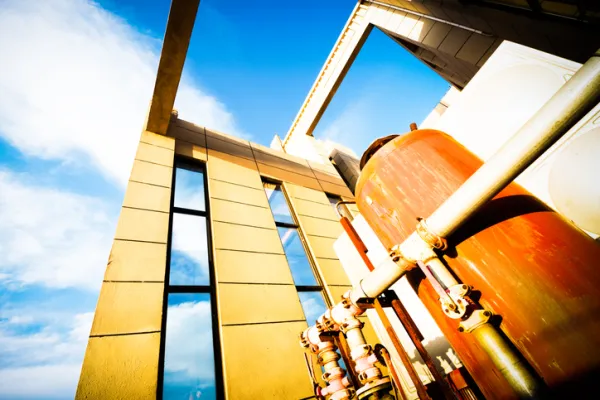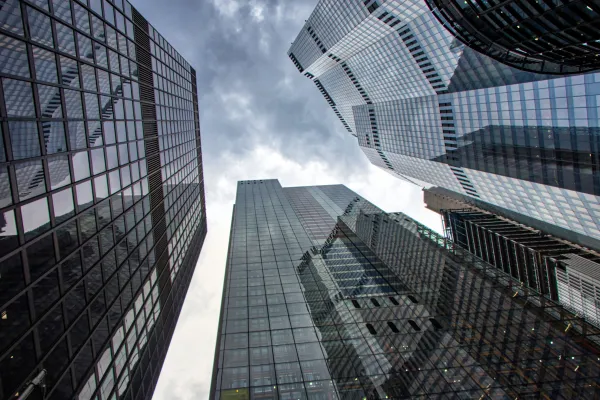After the Soviet era, Russia may no longer be a mystery wrapped in an enigma, but it is still very much a riddle.
Every day securities analysts must confront the investment paradox that is contemporary Russia. On one level, the aftershocks of the political earthquake that all but destroyed the Russian market's former star, Yukos Oil Co., are leaving investors uneasy and share prices locked in a trading range well below their 2004 high. At the same time, the nation is stable and prosperous and positioned to achieve more of the same. Alasdair Breach, research director of Brunswick UBS, says of President Vladimir Putin's administration, "One thing you have to give these guys: They produce phenomenally good macro policy."
Near-record oil prices continue to attract cash, which the government is using prudently. Early repayment of foreign debt has reduced the Russian state's liabilities to a mere 16 percent of GDP. The economy is expected to grow by more than 5 percent in 2005, for a seventh year in a row. Inflation in 2004 was a relatively tame 11.7 percent and is forecast to be in a similar range this year. Russian companies, overcoming their secretive ways, are beginning to publish fuller financial reports. Terrified by Yukos's $28 billion back-tax bill, the so-called oligarchs who control the country's largest enterprises are transferring fewer profits to offshore trading vehicles and keeping more on the books to be shared with investors as dividends.
For Russian equities, whose average price-earnings ratio is around 8, all this should theoretically push P/Es toward the Polish level of 10, if not Hungary's multiple of about 12. Yet centuries of governmental intervention and ham-handedness are hard to shake, and Russian politicians and bureaucrats are continuing many of the business-inhibiting practices of their predecessors. Continuing back-tax assessments, like the $1 billion bill presented in April to TNK-BP, Russia's second-biggest oil producer, reflect the ongoing conflicts between businessmen and bureaucrats and between a vibrant entrepreneurial class and a broader public that still tends to equate business with fraud.
Russian law is not sufficiently developed to regulate these tensions, so the ultimate arbiter becomes an ultrasecretive Kremlin, whose moods can only be guessed at. "Before Putin you had the feeling that if you knew the right people, you could understand what was going on," says Renaissance Capital research director Alexander Kazbegi, who captures the first-team position in Telecommunications in Institutional Investor's 2005 All-Russia Research Team. "Now large-scale decisions are made by Mr. Putin himself and a few advisers. We know less about the Kremlin than before."
Analysts covering the country, therefore, must be at least part-time Kremlinologists, and some are solving the riddle of modern Russia better than others. Kazbegi's firm, private partnership Renaissance Capital, dominates the II All-Russia Research Team for a second consecutive year, capturing nine of 11 first-team positions and 14 total team positions this year, compared with eight first-team slots and 15 total team positions in 2004 (see "Picking the Team," page 61).
The firm making the most dramatic improvement, though, is Troika Dialog, which rises from fourth to second place overall. Founded in 1991 by chief executive officer Ruben Vardanian, now 37, Troika claims ten total team positions, versus just four last year. The leap can be attributed to the firm's timely caution early in the year, when others were ebullient, and to better marketing of its research. Tying for third place, with six positions each, are Brunswick UBS, which last year became a wholly owned subsidiary of the Swiss banking powerhouse; and United Financial Group, 40 percent-owned by Deutsche Bank. Brunswick UBS, which was in third place last year as well, is down one position. UFG, which slips a notch from second, is down four team positions from last year. Retaining fifth place is Aton Capital Group, which has four team slots, up from three last year. And in sixth place again is Alfa Bank, with one team slot, down from two.
"Renaissance, Troika, Brunswick and UFG are the established Big Four of Moscow investment banking," says Charles Tenace, the Moscow-based chief investment officer of Alfa Capital Management, which oversees about $200 million in Russian investments. "A few groups like Aton and ourselves are mounting a challenge and having some success with it."
How important are political judgments in providing insights into Russian stocks? "Our biggest and best call over the past year was to sell Yukos and buy Gazprom," notes Troika Dialog's former research director, James Fenkner (ranked No. 3 in Equity Strategy), who left in late April to form a Moscow-based hedge fund, Red Star Asset Management (see People, page 9). The state-controlled gas monopoly's shares more than doubled in 2004, while those of the besieged Yukos collapsed. But as Fenkner points out, Gazprom's big gain stemmed from politics -- Putin's promise to remove the "ring fence" that limits foreign shareholdings and his general bias toward state companies -- rather than any new company initiatives.
Steven Dashevsky, Aton's director of research, who is also the No. 3-ranked Oil & Gas analyst, says his best advice to investors was urging them not to panic last November when Sibneft, the nation's fifth-largest oil producer, was served with a $760 million tax bill and its shares dropped nearly 20 percent in a day. The stock price recovered fully over the following three months as the Federal Tax Service proved amenable to negotiating the claim, which reportedly was settled for $300 million in March.
Conventional wisdom has it that the Yukos situation -- in which Mikhail Khodorkovsky, the former chief executive of the huge oil company, defied the Kremlin despite extensive warnings to stop -- was unique and provoked a unique response. In late May a Russian court found Khodorkovsky guilty on six of seven charges of fraud and tax evasion and sentenced him to nine years in a prison camp. He plans to appeal. Although brokers and investors in Russia say they do not expect a second Yukos-style business catastrophe, politics is not likely to diminish anytime soon as an investment theme. Most market players see low-intensity bureaucratic conflict weighing on the valuations of the most-visible natural-resources-based businesses, at least until Putin's second presidential term ends in 2008.
"Those waiting for Russia to embrace the rule of law and property rights should give up hope for the time being," warns Ian Hague, co-founder of New Yorkbased Firebird Management, which has about $400 million in Russian securities. "The current leadership has demonstrated that neither is in their constitution."
This sort of pessimism is constraining the Russian stock market even as the economy booms. A little more than a year ago, Russian stocks were on a tear. Shrugging off the Kremlin's attack on Yukos, the Moscow Stock Exchange's Russian Trading System index doubled in 13 months, peaking in April 2004 at 782. Today's atmosphere is far more sober. Yukos, the engine of that earlier bull run, is all but gutted as a distinct company, its key assets sold off or in the process of foreclosure by the state. The RTS fell as low as 518 last July and was at 646.5 in mid-May -- 17 percent below its high 13 months earlier. "This is a sadder but wiser place," concludes Alfa Capital's Tenace.
In addition to general political angst, another factor crimping the market is the Kremlin's post-Yukos drive to raise more taxes from the energy industry. A graduated levy now strips crude producers of 85 to 90 percent of their marginal profit on oil prices above $25 a barrel. German Gref, the minister for Trade and Economic Development and the government's most dependable free-market advocate, recently floated the idea of a price-linked tax for metals, too. Russia's extremely profitable extractive industries make tempting targets. Lukoil Oil Co., the nation's top producer, earned $4.1 billion in 2004, according to preliminary figures, and metals giant Norilsk Nickel netted $1.8 billion.
But the tax hikes, coming on the heels of Yukos's dismemberment, have depressed investment and growth. Russian industrial production grew by 3.9 percent year-on-year in the first quarter of 2005, down from 7.4 percent a year earlier, according to official statistics. Growth in the extractive industries was a mere 2.5 percent.
Nevertheless, there is some cause for optimism on the part of investors, even in this nervous environment. Affluence is rapidly spreading beyond the oligarch class. Although Russia still displays shocking, and potentially destabilizing, extremes of wealth and poverty, the Putin-era boom has been broadly distributive. Incomes have grown even faster than GDP, expanding by 12.5 percent on average in the year to March, according to official statistics. As most families received their homes for free after the Soviet breakup, the extra cash is being spent on goods and services provided by increasingly sophisticated homegrown companies. Sales of electronics, for example, will surge by 30 percent this year, to $5.6 billion, Renaissance projects.
Consumer companies riding this wave, along with smaller, domestically oriented manufacturers, are behind a new stream of public offerings that promises more diversity and balance for investors in Russia -- and more work for investment banks. Eight Russian firms completed initial public offerings in 2004, up from four in the previous two years combined. This year has already seen the country's biggest-ever share offering: Sistema, a Moscow-based conglomerate with consumer-oriented assets ranging from cell phone carrier Mobile TeleSystems to children's store chain Detsky Mir, raised $1.6 billion on the London Stock Exchange for an $8 billion valuation. Offerings in the pipeline range from discount retailer Pyaterochka to Severstal Auto, a sport utility vehicle producer spun off from steel giant Severstal. "The IPO flow is very good at this point," says Alexander Schwarzkopf, a partner at London-based Altima Partners, which manages about $450 million in Russian investments. "The consumer story in Russia started about two years ago, and the market is catching up to the fact that these sectors are seeing 30 percent annual growth."
Russian income is steadily turning into investable capital that, given a scarcity of other available instruments, bolsters the stock market. The RTS has bounced up 20 percent since the Yukos affair climaxed in December with the sale of the company's top production unit, Yuganskneftegaz. Investors clearly believe that no second Yukos is in the wings. Russian banks are growing rapidly again after a short setback during last summer's crisis of confidence. Deposits rose by 23 percent, to 4.9 trillion rubles ($180 billion), in the 12 months to February, according to the Central Bank of the Russian Federation.
Exporters contributing to last year's $87 billion trade surplus are awash in cash. The Central Bank has aggressively sold rubles for the past few years to keep the dollar and euro influx from excessively strengthening the currency, but an 18 percent rise in the nation's money supply during the second half of 2004 forced the bank to scale back. Growth in the broader money supply slowed to 2.5 percent in the first quarter of 2005 from year-end 2004, spelling further gains in the ruble, which has risen 3.2 percent against the dollar in the past year.
"We're fairly bullish on Russia's short-term prospects despite any politics because we see Russian banks and funds sitting on $10 billion in liquidity in a market where the total free float is around $40 billion," Firebird's Hague says.
Another bullish market force is the psyche of the Russian investor, who is more likely than his Western counterpart to chase market momentum and less likely to agonize over the broader legal environment.
"The Russian investor is more short-term oriented," says Alexander Golovtsov, head of investment at Moscow's UralSib Asset Management, which manages $1.3 billion. "To them, the Yuganskneftegaz sale in December seems like a long time ago."
As the market segments into Russian domestic and foreign capital sectors, Moscow's investment banks, which have been scrapping over the same brokerage business for the past decade, are starting to seek out niches. With access to investors outside the country, Brunswick UBS and UFG have considerable advantage in underwriting large international equity and Eurobond placements, says Renaissance's Kazbegi. UFG was lead underwriter on Russia's second-biggest IPO this year, raising $151 million for juice maker Lebedyansky in March. Brunswick UBS advised on two marquee direct investment deals late last year: French oil company Total's $1 billion acquisition of 25 percent of Russian gas producer Novatek, and German engineering giant Siemens' proposed purchase of Russian turbine producer Power Machines, a deal that was subsequently barred by Russia's Antimonopoly Ministry.
Even as the global investment banking giants that fled Russia after its 1998 financial collapse are now taking a second look, it won't be easy to build a research operation to compete with those put together by this year's winners. In a country where notoriously little is as it seems, local insight may be priceless.





